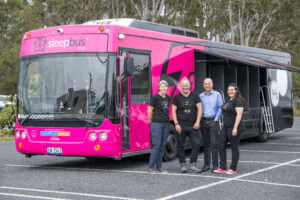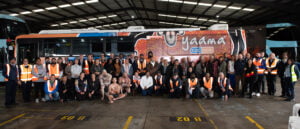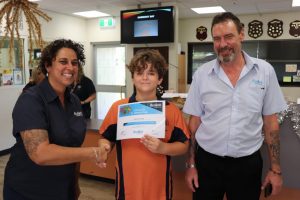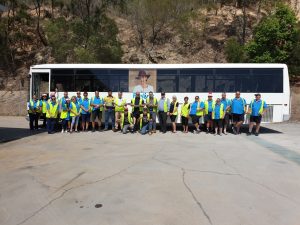Millions of journeys are made over the year with CDC. With every journey, whether it is for work or play, we foster mobility, connectivity and inclusion. We take pride in serving and supporting the local communities in all geographies that we operate. We foster an environment of trust by engaging the communities we serve and contributing in every way that we can.
Across Australia, we partner with like-minded organisations that are passionate in giving back to the communities and supporting those in need. We support our partners through collaborations and awareness campaigns as well as financial assistance for projects that promote diversity and social inclusion, youth empowerment and leadership, wellbeing, security and sustainability.

Making A Difference Through Partnerships
To reduce anti-social behaviour amongst the youth where CDC operates in western Melbourne, we have partnered with community leaders in the region. CDC supports Western Chances, an organisation that gives underprivileged but talented young people in Melbourne’s west a chance to realise their potential through merit-based, tailor-made scholarships and opportunity programs, including work placement with CDC. CDC also contributes by providing yearly MYKI travel passes for students requiring financial assistance.
ComfortDelGro Australia has proudly supported sleepbus since 2019 by donating buses to be repurposed as sleepbuses and provided on-going maintenance, storage, cleaning and fuel.
Providing safe, temporary overnight accommodation for Australians doing it tough, sleepbus gets people off the street by offering an immediate, cost-effective solution for our society’s most vulnerable. 100% volunteer run, sleepbus provides safe, temporary overnight accommodation for those in need.

Aboriginal & Torres Straits Islander Partnerships
Contributing to Aboriginal and Torres Strait Islander reconciliation is a significant priority for CDC. For full details, please see our Reconciliation Action Plan.
Our relationships with both the Clontarf and Stars Foundations are important to us, enabling us to contribute and support young Aboriginal and Torres Strait Islander men and women respectively.
Our major partner, the Clontarf Foundation, seeks to improve the education, discipline, life skills, self-esteem and employment prospects of young Aboriginal and Torres Strait Islander men.
CDC has also worked closely with the Stars Foundation which supports Aboriginal and Torres Strait Islander girls to improve health and education outcomes by conducting training such as road safety training.
We have also built a close relationship with the Larrakia Nation Aboriginal Corporation in the Northern Territory and support many of their community initiatives. Larrakia Nation has been invaluable in helping us raise cultural awareness within our organisation.

Sustainability Partnerships
CDC is focused on environmental sustainability. We value partnerships with stakeholders such as Parks Victoria, through which we have contributed to a range of initiatives including Australia’s first Dementia Friendly Forest and Sensory Trail at Woowookarung Regional Park and a special Sensory Garden at Serendip Sanctuary in Lara, an initiative by Parks Victoria aimed at fostering a deeper connection between people and nature.
CDC also works with several partners to help deliver greener vehicle options. With these partners, CDC has established Australia’s largest hybrid bus fleet, initiated a hydrogen bus trial and begun the rollout of electric buses for a major trial in Melbourne.
More details on CDC’s Community Engagement are available in the video below.

Supporting Local Communities
In Darwin, our team has a long history of proactive engagement with the local communities.
Community engagement is a pillar that CDC invests in to benefit the local communities with the long-term goal of restoring respect to bus drivers.
In line with this initiative, we have launched a school education program that aims to teach children about the importance of mutual respect and behaviour on public transport. By helping kids understand the importance of mutual respect, over time we hope to reduce the incidence of anti-social behaviour towards our drivers and commuters, creating safer public transport.

Contribution to Australian Communities in Need
The CDC We Care Fund was established in 2020 with an initial investment of $250,000 to assist employees and members of our local communities affected by the bushfires. The Fund aims to support families with immediate housing and living needs, disaster relief efforts, as well as providing transport services to emergency service volunteers. The Fund was transitioned to funding long-term assistance and recovery in vulnerable communities, education efforts, as well as preventative measure in challenging situations from bushfires, pandemic or any disaster faced by our broader communities that we serve. It has since been used to assist employees and communities affected by severe storms, floods and other disasters.
